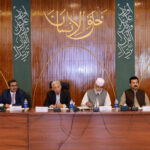UNITED NATIONS, Nov 22 (APP):UN Secretary-General Antonio Guterres has condemned Saturday’s rocket attacks into the heart of Kabul that killed at least eight civilians and wounded many more.
The rockets reportedly were fired from vehicles, hitting several densely populated areas in the capital city. The ISIL/Da’esh affiliate in Afghanistan has claimed responsibility, according to media reports which cited intelligence sources.
In a statement issued by his spokesman, the UN chief underscored the urgency of ending the violence in Afghanistan. He expressed his deepest sympathies to the families of the victims and wished a speedy recovery to the injured. “He (UN chief) hopes the Afghanistan Peace Negotiations can swiftly achieve a de-escalation of the conflict and cessation of attacks in order to save lives,” the statement said.
“The upcoming Afghanistan 2020 Conference on 23 and 24 November, co-hosted by Afghanistan, Finland, and the United Nations, is an opportunity to renew commitments to the peaceful development and future prosperity of the country.” More than 70 countries are expected to participate in the donor conference, which aims to coordinate development cooperation for the period from 2021-2024.
The event will take place virtually from the UN Office in Geneva, with only the co-hosts meeting in person. The UN Assistance Mission in Afghanistan (UNAMA) has also extended condolences to the bereaved.
In a post on Twitter, UNAMA said it was “Deeply shocking and deplorable that civilians should be subjected to such indiscriminate attacks. Those responsible must face justice.”
The rocket attacks occurred just hours before US Secretary of State Mike Pompeo was scheduled to meet in Qatar with representatives from the Afghan Government and the Taliban, who have been holding talks in the Gulf State since September.
Qatar was the latest stop on Pompeo’s whirlwind lap of diplomacy in the waning hours of the Trump administration, looking to push forward White House foreign policy objectives before President-elect Joseph Biden takes office in January.
The Pentagon said this week that it would reduce the number of U.S. troops in Afghanistan by nearly half — to 2,500, down from 4,500 by mid-January.





